Matt Rees's Blog - Posts Tagged "egypt"
Obama's speech: the view from Jerusalem
President Barack Obama spelled out what he expects of the Israeli government in his Cairo speech, issuing a challenge that most commentators here believe Prime Minister Benjamin Netanyahu has no way of meeting [I wrote on Global Post today:].
Obama’s speech, carried live on all three main Israeli television stations, made clear his firm opposition to any sort of building in Israel’s West Bank settlements. “This construction violates previous agreements and undermines efforts to achieve peace,” Obama said. “It is time for these settlements to stop.”
The realization that Obama is serious about halting settlements has been growing in Israel since Secretary of State Hillary Clinton visited in early March. At first Israeli politicians and diplomats thought it could be dealt with by the same sleight of hand that stymied previous administrations — Israel would agree to a freeze on settlement construction, except for “natural growth” to accommodate the children of existing settlers. In reality that meant as much building as Israel wanted.
Since Netanyahu’s visit to Washington two weeks ago, aggrieved Israeli government officials (who weren’t immediately available to comment on Obama's speech) have complained that there were unwritten agreements with the Bush White House allowing Israel to build in the settlements, provided they pulled out of “illegal outposts” — mainly composed of a few young settlers living in shipping containers on hillsides across the valley from existing settlements.
Obama’s speech made it clear that such unwritten promises are not part of the debate. Read more....
Obama’s speech, carried live on all three main Israeli television stations, made clear his firm opposition to any sort of building in Israel’s West Bank settlements. “This construction violates previous agreements and undermines efforts to achieve peace,” Obama said. “It is time for these settlements to stop.”
The realization that Obama is serious about halting settlements has been growing in Israel since Secretary of State Hillary Clinton visited in early March. At first Israeli politicians and diplomats thought it could be dealt with by the same sleight of hand that stymied previous administrations — Israel would agree to a freeze on settlement construction, except for “natural growth” to accommodate the children of existing settlers. In reality that meant as much building as Israel wanted.
Since Netanyahu’s visit to Washington two weeks ago, aggrieved Israeli government officials (who weren’t immediately available to comment on Obama's speech) have complained that there were unwritten agreements with the Bush White House allowing Israel to build in the settlements, provided they pulled out of “illegal outposts” — mainly composed of a few young settlers living in shipping containers on hillsides across the valley from existing settlements.
Obama’s speech made it clear that such unwritten promises are not part of the debate. Read more....
Guardian: Top 10 Arab-world novels
"The Arab literary world and Western publishing don't cross over much. The literature of the Arab world is largely unknown in the west, and even westerners who write about Arabs are sometimes seen as fringe, cult writers. That comes at a cost to the west, because literature could be such an important bridge between two cultures so much at odds. What we see of the Arab world comes from news reports of war and other madness. Literature would be a much more profound contact.
"I live in Jerusalem and write fiction about the Palestinians because it's a better way to understand the reality of life in Palestine than journalism and non-fiction. The books in this list, in their different ways, unveil elements of life across the Arab world that you won't see in the newspaper or on TV."
Published on January 13, 2010 23:17
•
Tags:
abdulrahman-munif, ala-al-aswany, algeria, arab, arab-fiction, arab-novels, british-newspapers, cairo, egypt, emile-habiby, ibrahim-nasrallah, iraq, israel, kanaan-makiya, lawrence-durrell, middle-east, naguib-mahfouz, palestine, palestinians, paul-bowles, tariq-ali, the-guardian, yasmina-khadra
How to keep up on the Middle East
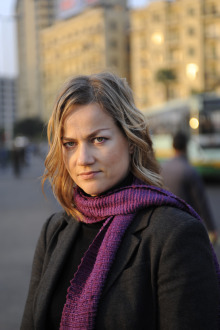 JERUSALEM — Time was anyone with an interest in the Middle East could be guaranteed a couple of books a year would be brought out by U.S. journalists based in the region. Now many of those correspondents are history, with news bureaus closing and those that remain cutting back. The new books written by Americans tend to be by think-tank types or others whose agenda is hard to figure out.
JERUSALEM — Time was anyone with an interest in the Middle East could be guaranteed a couple of books a year would be brought out by U.S. journalists based in the region. Now many of those correspondents are history, with news bureaus closing and those that remain cutting back. The new books written by Americans tend to be by think-tank types or others whose agenda is hard to figure out.But you know that already. It’s one reason you’re reading GlobalPost, which was founded partially to replace the disappearing corps of U.S. foreign correspondents. [That's where I first posted this.]
So GlobalPost has solved your journalism problem. But, still, what’re you going to do about the books? With a book written by a foreign correspondent you couldn’t always be sure of a good read —I’ve ploughed through some stinky “notebook dumps” in my time by reporters who padded pages with meaningless tales of their Palestinian and Israeli “friends” — but you at least knew that it was by a responsible journalist answerable to editors and readers even for his extracurricular writings. Not so with think-tank academics whose financing and agenda can make for deeply skewed accounts.
The answer: Europeans. A new book demonstrates what I’m talking about.
“Hold onto Your Veil, Fatima!” is an expose of contemporary Egypt that’s at once harrowing and humorous by Sanna Negus, a reporter for Finland’s YLE Radio and TV.
Negus came to the Middle East in the mid-1990s for graduate studies in Cairo, largely because she wanted to learn an unusual language and figured Arabic fit the bill. (It’s not as unusual as Finnish, but then she already had that covered.) She returned to Cairo, working for the English-language Cairo Times and staying for a decade as YLE’s correspondent. She’s been based in Jerusalem the last two years. (Lawrence Wright, who won a Pulitzer for “The Looming Tower: al-Qaeda and the Road to 9/11,” writes in the book’s foreword that Negus is “one of the most informed and well-connected reporters in the region.”)
Read the rest of this post on my blog The Man of Twists and Turns.
Published on June 20, 2010 03:16
•
Tags:
9-11, american-colony, cairo, cairo-times, crime-fiction, egypt, female-circumcision, finland, genital-mutilation, global-post, hold-onto-your-veil-fatima, israe, jerusalem, journalism, lawrence-wright, middle-east, middle-east-books, pulitzer-prize, sanna-negus, the-looming-tower, time-magazine, women
The Barbara Cartland of Cairo…Sort of: Sanna Negus’s Writing Life interview
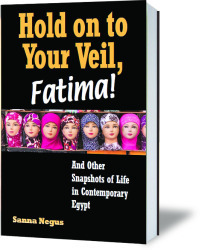 Cairo is a place we all know to some degree, even if only the image of the pyramids and the Sphinx. A short visit there is enough to make you wonder about how much of this teeming metropolis you really don’t know. No writer gets so deep as Sanna Negus under the skin of this ancient city, which remains key to the future of the benighted Middle East. Sanna’s the Middle East correspondent for Finnish radio and television. Her new book “Hold onto Your Veil, Fatima! And Other Snapshots of Life in Contemporary Egypt” is a stunning portrayal of Egypt that’s both homage and expose. Pulitzer winner Lawrence Wright calls her “one of the most informed and well-connected reporters in the region.” She’s also one of the best writers. Here she talks about the decade she spent in Cairo (before moving to Jerusalem) and how she wrote her book.
Cairo is a place we all know to some degree, even if only the image of the pyramids and the Sphinx. A short visit there is enough to make you wonder about how much of this teeming metropolis you really don’t know. No writer gets so deep as Sanna Negus under the skin of this ancient city, which remains key to the future of the benighted Middle East. Sanna’s the Middle East correspondent for Finnish radio and television. Her new book “Hold onto Your Veil, Fatima! And Other Snapshots of Life in Contemporary Egypt” is a stunning portrayal of Egypt that’s both homage and expose. Pulitzer winner Lawrence Wright calls her “one of the most informed and well-connected reporters in the region.” She’s also one of the best writers. Here she talks about the decade she spent in Cairo (before moving to Jerusalem) and how she wrote her book.How long did it take you to get published?
The initial Finnish version (2005) came out quite smoothly. I first got a writing grant from the biggest publishing house in Finland, WSOY, which allowed me to work on three sample chapters. Less than a year later we signed a contract. The English version took longer to publish, mainly because I got distracted by other things. One UK publishing house was at first interested, but then withdrew and I guess it depressed me and I buried the project for a while. After some friends kicked my behind and told me to get my act together, I took a look at my bookshelf’s Middle Eastern books. So I wrote to Garnet on Monday, they answered on Tuesday and on Friday I got a contract!
Would you recommend any books on writing?
This being my first book, I figured I should probably look into some writing guides. So I read a couple of books in Finnish. While these books gave a boost to my confidence, they still didn’t solve the problem of the blank page. When I was taking my first steps as a journalist (and I never studied journalism or literature), I found Jon Franklin’s Writing For Story useful. But at the end of the day, it’s better to read what other people have written in your genre.
What’s a typical writing day?
The morning starts with some form of exercise, followed by breakfast and several hours of futzing around (checking my email every five minutes, making yet another cup of coffee, doing laundry, going to a supermarket to buy a single item…) Typically I would do research or write down interviews during the day and write late into the night. My creative powers unfold after sunset.
Read the rest of this post on my blog The Man of Twists and Turns.
Published on July 15, 2010 03:17
•
Tags:
barbara-cartland, cairo, egypt, fear-and-loathing-in-las-vegas, finland, hunter-thompson, interviews, jerusalem, jon-franklin, michael-chabon, michel-houellebecq, middle-east, nonfiction-books, orhan-pamuk, salman-rushdie, sanna-negus, sofi-oksanen, stieg-larsson, the-writing-life, writing, writing-for-story
Omar Yussef predicted Cairo and Tunis
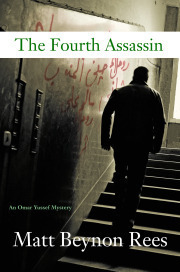 If you’ve been wondering why the people of Tunisia and Egypt have risen up against their dictators and why it caught Washington with pants down, it’s because you didn’t read THE FOURTH ASSASSIN, the latest of my Palestinian crime novels.
If you’ve been wondering why the people of Tunisia and Egypt have risen up against their dictators and why it caught Washington with pants down, it’s because you didn’t read THE FOURTH ASSASSIN, the latest of my Palestinian crime novels.In THE FOURTH ASSASSIN, which was published exactly a year ago, my Palestinian sleuth Omar Yussef travels to New York for a conference at the UN. While there, he uncovers an assassination plot. But he also has to address the conference about the life of ordinary Palestinians —— and the people of other Arab countries.
Here’s a passage from that chapter of the book, with Omar addressing the delegates from Arab countries and the Americans:
“ ‘It may be hard for you to understand, but what ordinary Palestinians want and what they battle for every day is precisely what’s denied to most of your citizens in the Arab countries: freedom and economic prosperity.’
The Libyan delegate removed his finger from his nose and flicked it angrily. The Syrian strode down from the rear of the hall, dropping his
cigarette. The Lebanese stepped out the butt on the carpet as he followed.
‘How can you, the Arab countries, dictate a solution for the Palestinians, when you suffer from many of the same problems? In fact, you, the governing class, thrive on the lack of democracy, the inequality of wealth. Take away the Israeli occupation and the Palestinians would be closer to freedom and a functioning economy than most of your peoples.’
Read the rest of this post on my blog The Man of Twists and Turns.
Published on February 02, 2011 01:00
•
Tags:
bashar-assad, brooklyn, cairo, crime-fiction, egypt, middle-east, new-york, omar-yussef, politics, syria, the-fourth-assassin, tunis, united-nations, washington
The Reverse Orientalist: Kamal Abdel-Malek’s Writing Life Interview
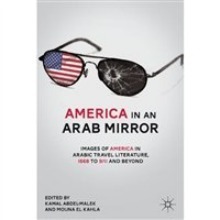 When Kamal Abdel-Malek was a young student, he chose to study outside the Arab world, eventually becoming a professor at Brown and Princeton Universities in the US. It was the first step in the physical and intellectual journeys of this intriguing Egyptian writer. Born in Alexandria and now a teacher of Arabic literature at the American University in Dubai, Abdel-Malek’s latest publication (available in English) is perhaps his most important, because it answers many of the questions Westerners asked themselves about the Arab world since the 9/11 attacks almost a decade ago. Abdel-Malek’s technique is an unusual and compelling one, because instead of seeking to explain how Arabs are, in America in an Arab Mirror: Images of America in Arabic Travel Literature, 1668 to 9/11 and Beyond he shows how we look to them. It’s a reversal of what the Palestinian intellectual Edward Said noted in Westerners writing about the Middle East: When you read the perceptions of Arab writers about Western society, it shows as much about the Arab writer as it does about the country he’s observing. Kamal took time to explain more about this vitally important book and to talk about his life as a writer. Demonstrating his originality as a thinker, he’s also the first writer I’ve interviewed on this blog to give due credit to Dan Brown.
When Kamal Abdel-Malek was a young student, he chose to study outside the Arab world, eventually becoming a professor at Brown and Princeton Universities in the US. It was the first step in the physical and intellectual journeys of this intriguing Egyptian writer. Born in Alexandria and now a teacher of Arabic literature at the American University in Dubai, Abdel-Malek’s latest publication (available in English) is perhaps his most important, because it answers many of the questions Westerners asked themselves about the Arab world since the 9/11 attacks almost a decade ago. Abdel-Malek’s technique is an unusual and compelling one, because instead of seeking to explain how Arabs are, in America in an Arab Mirror: Images of America in Arabic Travel Literature, 1668 to 9/11 and Beyond he shows how we look to them. It’s a reversal of what the Palestinian intellectual Edward Said noted in Westerners writing about the Middle East: When you read the perceptions of Arab writers about Western society, it shows as much about the Arab writer as it does about the country he’s observing. Kamal took time to explain more about this vitally important book and to talk about his life as a writer. Demonstrating his originality as a thinker, he’s also the first writer I’ve interviewed on this blog to give due credit to Dan Brown.How long did it take you to get your latest book published?
Two years. America in an Arab Mirror was published in April by Palgrave Macmillan in New York.
Would you recommend any books on writing?
Yes, books like these are helpful: On Writing by Stephen King, Break into Fiction, First Draft by Buckham and Love, and of course the classic, The Elements of Style by Strunk and White.
What’s a typical writing day?
I teach during the day so the only time available is either early in the morning or late in the evening. The best time is in the morning, especially when I wake up after a good night sleep.

Plug your book. How would you describe what it’s about? And of course why’s it so great?
America in an Arab Mirror: Images of America in Arabic Travel Literature, 1668 to 9/11 and Beyond deals with Arab-American relations, cross-cultural communication, and cultural understanding in general. The New York Times published a good review of it on April 21, 2011. My interest in Arab-American encounters in history, literature, and the arts started over a decade ago. The accounts of Arab travelers to America have always fascinated me. I widely researched the topic and had opportunities to read papers on it at Princeton and Dartmouth where I greatly benefited from the comments and the questions posed by colleagues in the field of Arabic and Middle Eastern studies. A question that was raised by a Princeton Arabist after one of my talks on the topic was whether Arab writings on America could be regarded as a case of Occidentalism, a counter-Orientalism of sorts. In some ways this book is a reversal of what Edward Said described as the West’s Orientalist view of the East. One could say that its stories are an Arab way of saying, “We, too, can subjugate you, Westerners, to our tourist, voyeuristic gaze.”
What’s your favorite sentence in all literature, and why?
If the question is about “favorite lines” instead of “favorite sentence” then I would mention, without hesitation, the evocative lines uttered by Macbeth upon receiving the news of his wife’s death.
Life's but a walking shadow, a poor player,
That struts and frets his hour upon the stage,
And then is heard no more. It is a tale
Told by an idiot, full of sound and fury,
Signifying nothing.
Macbeth Act 5, scene 5
What’s the best descriptive image in all literature?
But let there be spaces in your togetherness and let the winds of the heavens dance between you. Love one another but make not a bond of love: let it rather be a moving sea between the shores of your souls. -- Khalil Gibran
The teacher who is indeed wise does not bid you to enter the house of his wisdom but rather leads you to the threshold of your mind. -- Khalil Gibran
Who’s the greatest stylist currently writing?
In Arabic I must mention Yusuf Idris, the greatest short story writer and playwright. In Arabic he employs the different register of modern Arabic and the very evocative expressions of the everyday spoken Egyptian colloquial. In my opinion he, not Naguib Mahfouz, should have received the Nobel Prize for Literature. Outside the Arab world one can mention Gabriel García Márquez.
Read the rest of this post on my blog The Man of Twists and Turns.
Published on May 08, 2011 06:38
•
Tags:
9-11, america-in-an-arab-mirror, arab-world, arab-writers, egypt, egyptian-writer, interviews, kamal-abdel-malek, middle-east, writers, writing-life
Inspiration–and laughter–for the ladies: Ghada Abdel Aal’s Writing Life
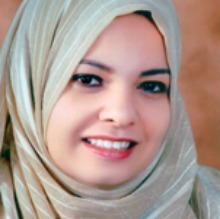
When she was in her early twenties, Egyptian writer Ghada Abdel Aal began the complicated process of seeking a spouse. It involved meetings in parental living rooms over awkward glasses of tea. On one such occasion her potential groom spent his time screaming at a soccer game on tv. Another turned out to have a couple of wives already, and a would-be husband who was also a policeman started investigating her background for criminality or other unwanted elements. She turned to blogging about these meetings and discovered that other Egyptian women had similar experiences. Since then, her blog has become a huge success around the Arab world; her book I Want to Get Married has been published in several languages (it came out last year in English) and has been adapted for television. Ghada, a religious Muslim who covers her hair and who is quite hilariously funny in person and in her writing, has had the kind of cultural impact that makes her countrymen leap around with excitement when they meet her (as I can attest from having seen her at a book festival in an Arab country not long ago.) Here’s what she told me about how she came to write her book and its impact on her life:
How long did it take you to get your book published?
I got the book deal 18 month after I started the blog
Would you recommend any books on how to write?
I'm now reading a very interesting book "A Novel in a Year" which is a one year writing workshop for beginners or for people who are suffering during the journey of writing their novel, written by Louise Doughty.
What’s a typical writing day?
I usually save 4-5 hours a day for writing, I start at 3 am & end at 8 am. Most of this time of course gets wasted staring at the ciling or out of my window. But this is the time I force myself to sit at my desk for the purpose of writing
Do you think more young writers will be “discovered” because they write popular blogs, as you did?
A lot of them have been discovered because of my book, as it showed the publishers that you can be a blogger, you can be young and still be a best seller author
How would you describe what your book is about? And of course tell us why it’s so great?

My book is talking about a girl who is about to be thirty, she is going through this process that we call "living room marriages " and faces a bad suitor everyday. The general idea is showing the pressure that women get from the society to get married before reaching thirty, which is the expiration date of Egyptian girls. I guess it was successful because it spoke out about a problem that all girls face but no one usually talks about. It also does that in a satirical way, which is very popular in Egypt today.
Are you still looking for a husband? Or are you less interested, now that you’re a popular writer?!
I'm not allowed to "look," just to "wait." Well , it's not my first priority anymore, but I would like to have children one day and getting married is the only way to do that.
Read the rest of this post on my blog The Man of Twists and Turns.
Published on May 17, 2011 23:41
•
Tags:
arab, bloggers, blogs, egypt, ghada-abdel-aal, i-want-to-get-married, interviews, middle-east, muslim, north-africa, women, writers, writing-life



